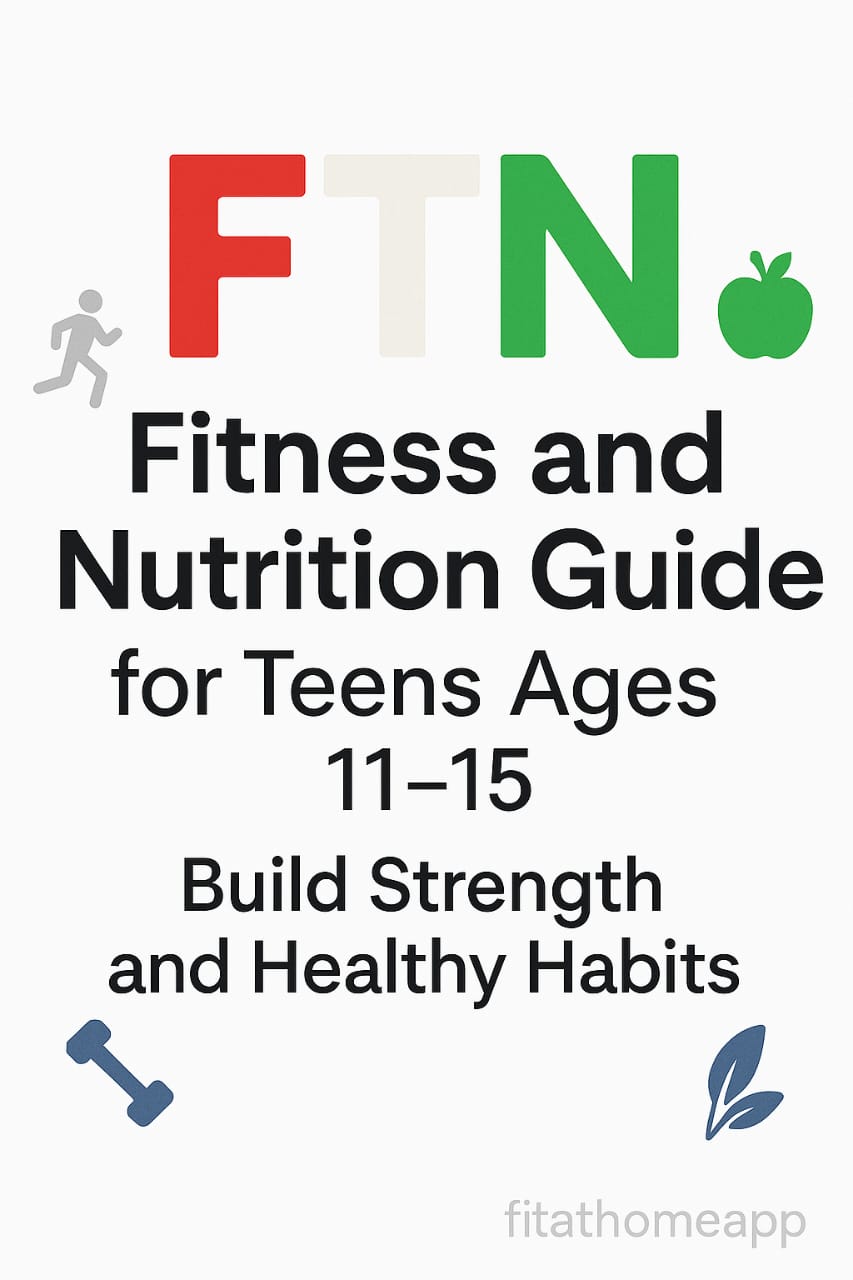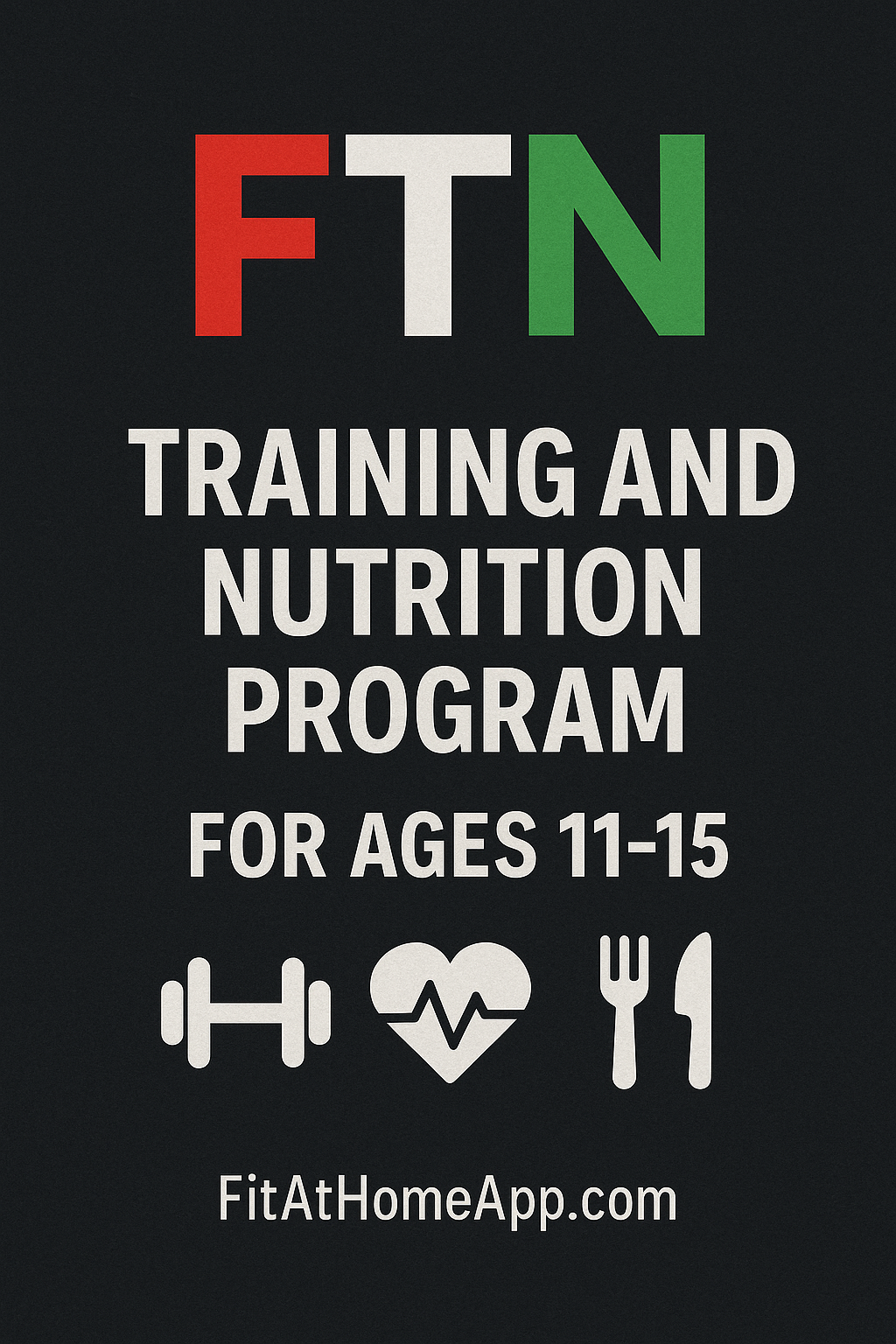Understanding the Importance for teen fitness 💪👟
For teenagers between the ages of 11 and 15, staying active and healthy is more important than ever. These years are filled with rapid physical growth, emotional shifts, and important social development. Engaging in regular physical activity and developing good nutrition habits can help teens build a solid foundation for a healthy future—not just physically, but mentally and emotionally as well.
In this article, we’ll explore why fitness matters so much during the teenage years, how nutrition supports this growth, and how young people can build routines that lead to lasting wellness.
Why Physical Fitness Matters for Teens 🏃♀️⚽
Teenagers are growing fast. Their bones are lengthening, muscles are developing, and hormones are changing—all of which require energy, strength, and care. Regular exercise during this time doesn’t just help with fitness—it improves posture, coordination, and flexibility while supporting healthy weight and cardiovascular function.
But physical activity has mental and emotional benefits too. Exercise releases feel-good chemicals called endorphins, which help reduce stress and anxiety. This can be especially important for teenagers dealing with academic pressure, social challenges, or changes in self-esteem. Teens who stay active tend to feel more confident, sleep better, and have improved focus during school.
Perhaps even more surprisingly, physical fitness is strongly linked to better academic performance. Studies have shown that teens who exercise regularly tend to have better memory, improved attention spans, and more positive classroom behavior. So whether it’s walking, biking, dancing, or playing sports, moving your body helps sharpen your mind.
The CDC recommends at least 60 minutes of moderate to vigorous physical activity each day for teens. That could be anything from playing a team sport to doing a home workout or simply walking the dog. What matters most is consistency.
Nutrition: Fueling a Growing Body 🍎🥦
While exercise is important, it can’t do the job alone. Teenagers also need the right nutrition to support their changing bodies and active lifestyles. Eating a balanced diet helps with energy levels, concentration, immune function, and healthy development.
Here are some of the most essential nutrients for teens:
Protein 🥚 – Helps build and repair muscle and tissues. Good sources include chicken, fish, eggs, beans, and nuts.
Calcium 🧀 – Vital for building strong bones and teeth. Found in dairy products, leafy greens, and fortified plant-based milks.
Iron 🥩 – Supports red blood cell production and energy. Found in meats, legumes, and iron-fortified cereals.
Vitamin A 🥕 – Promotes healthy vision and immune strength. Found in carrots, sweet potatoes, and dark leafy greens.
Vitamin C 🍊 – Helps the body absorb iron and fight off infections. Found in citrus fruits, strawberries, and bell peppers.
Vitamin D 🐟 – Works with calcium for bone health. Comes from sunlight, eggs, and fortified foods.
To keep things simple, teens should aim to eat colorful meals, full of fruits and vegetables, lean proteins, whole grains, and healthy fats. Processed snacks and sugary drinks should be kept to a minimum—not banned completely, but enjoyed in moderation.
Creating a Personal Fitness Plan 📋🏋️
Every teen is different, so every fitness plan should be unique too. Whether you’re interested in building strength, improving endurance, or just becoming more active in general, the key is to make it fun and personal.
Step 1: Set Realistic Goals 🎯
Start with small, achievable targets. This could be as simple as “walk for 20 minutes after school” or “do 10 push-ups a day.” As strength and stamina grow, goals can become more ambitious.
Step 2: Choose Activities You Enjoy 🎮🏀
Some teens love team sports like soccer or basketball. Others prefer solo workouts like swimming, biking, or running. Yoga, dance, or martial arts can be great alternatives. The best workout is the one you’ll stick with.
Step 3: Mix It Up 🔄
A balanced routine should include:
Strength training (push-ups, resistance bands)
Cardio (jogging, jumping rope)
Flexibility exercises (stretching, yoga)
Doing a mix of these keeps things interesting and reduces the risk of injury.
Step 4: Track Your Progress 📱
Use a journal or a mobile app to log workouts and meals. This helps spot improvements, stay motivated, and build healthy patterns over time.
Building Healthy Habits & Staying Motivated 💡🧠
It’s not always easy for teens to stick with a routine—between homework, social life, and screen time, there’s a lot competing for attention. That’s why building small, consistent habits is better than going all-in and burning out.
Time Management 🕒
Use a calendar or planner to carve out time for workouts. This could mean a quick morning stretch, a lunchtime walk, or after-school sports. Making fitness part of your daily schedule helps it become second nature.
Dealing With Peer Pressure 🤝
Social media, school cliques, and outside expectations can lead to unhealthy comparisons. It’s important for teens to remember that everyone’s body is different, and health isn’t about looking a certain way—it’s about feeling good, strong, and confident.
Finding supportive friends who share health goals, or joining community fitness groups, can make a big difference in staying on track.
Celebrate Small Wins 🎉
Progress takes time. Reward yourself when you hit a goal—whether it’s new workout gear, a fun outing, or simply acknowledging your hard work.
Challenges Teens Might Face – and How to Overcome Them 🚧🧩
Teenagers may face a range of obstacles on their health journey, including:
Busy schedules 📝
Solution: Start small—10-minute workouts still count.Low motivation 😴
Solution: Listen to music, set reminders, or buddy up with a friend.Unrealistic goals 🧍♂️
Solution: Focus on consistency, not perfection.
By recognizing these barriers early, teens can develop strategies to keep moving forward.
The Long-Term Benefits of Starting Young 🌱🏆
Adopting healthy habits as a teenager lays the groundwork for a strong and healthy adulthood. Staying active helps reduce the risk of chronic diseases like heart disease, obesity, and diabetes. It also improves sleep, focus, and emotional regulation—skills that are valuable throughout life.
Teenagers who build these habits early are more likely to carry them into college and adulthood, making it easier to stay fit and well later in life.
Conclusion: Invest in Your Health Today for a Stronger Tomorrow 🌞
Fitness and nutrition are not just trends—they’re tools for building a better life. For teens aged 11 to 15, this is the perfect time to take charge of your health and develop routines that will support you for years to come.
Remember:
Move your body every day.
Eat balanced meals with lots of colors.
Set goals that inspire you.
Surround yourself with support.
Your health is one of the greatest gifts you have—start taking care of it today, and your future self will thank you. 💪🥗🚴
My Take — “YThrive GROW 1: 10–15 Year Old Total Body Workout”
This video from YMCA at Home is a fantastic fit for young teens beginning their fitness journey. The trainer guides participants through straightforward strength and cardio moves without any equipment—making it ideal for home workouts or before/after school.
What I truly appreciate is its focus on form and accessibility. It encourages teens to move confidently, regardless of fitness level. To make this guidance even stronger, a short segment on warming up, cooling down, or hydration tips would be a perfect addition.
Overall, this video complements the article beautifully—it’s practical, safe, and empowering. Highly recommended for parents and teens looking to get active with confidence


